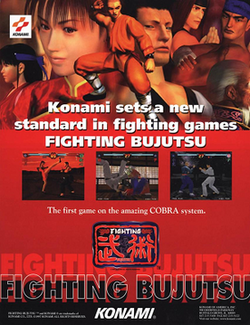Fighting Bujutsu
Topic: Software
 From HandWiki - Reading time: 2 min
From HandWiki - Reading time: 2 min
| Fighting Bujutsu | |
|---|---|
 North American arcade flyer | |
| Developer(s) | Konami |
| Publisher(s) | Konami |
| Director(s) | Kazuya Takahashi |
| Producer(s) | Hiroyasu Machiguchi |
| Composer(s) | Mutsuhiko Izumi Naoki Maeda |
| Platform(s) | Arcade |
| Release | August 1997 |
| Genre(s) | Fighting |
| Mode(s) | Single player, multiplayer |
| Arcade system | Konami Cobra |
Fighting Bujutsu, known in Japan as Fighting Wu-Shu (FIGHTING武術 (ファイティングうーしゅ) lit. "Martial Fighting"), is an August 1997 3D fighting arcade game developed and published by Konami. It is Konami's second attempt in the 3D fighting game market, after their 1996 Lightning Legend, and was released only in arcades.
Fighting Bujutsu was unveiled as one of the first games powered by the Konami Cobra System Hardware (the other being Racing Jam) in a 10-minute videotape shown at the 1997 ASI arcade show. At this point it had no working title, and was referred to only by the codename "PF 573".[1][2] It was shown again at that year's JAMMA show, by which time it was named Fighting Wu-Shu.[3][4][5] According to Next Generation, there was "some question of how (or if) to present [Fighting Wu-Shu] to the U.S. market."[6] The game made its U.S. debut, now under the title Fighting Bujutsu, at the AMOA Expo in Atlanta in October 1997.[7]
On January 21, 1998, an official soundtrack of Fighting Bujutsu's background music was published by Konami and distributed by King Records exclusively in Japan as Fighting Wu-Shu Original Game Soundtrack (FIGHTING武術 オリジナル・ゲーム・サントラ).[8]
Gameplay
Much like Sega's Virtua Fighter 2, Fighting Bujutsu utilizes a control scheme consisting of a control stick and three buttons: Punch, Kick, and Guard.[4] A Beginner Mode maps combo techniques to individual buttons.[9]
Reception
In Japan, Game Machine listed Fighting Bujutsu on their November 15, 1997 issue as being the eighth most-successful dedicated arcade game of the month.[10]
References
- ↑ "Konami Steals the Show". Next Generation (Imagine Media) (30): 23. June 1997. https://archive.org/stream/NextGeneration30Jun1997/Next_Generation_30_Jun_1997#page/n23.
- ↑ "Konami Reveals More 'Cobra' Games". Electronic Gaming Monthly (Ziff Davis) (94): 82. May 1997.
- ↑ "JAMMA & AMOA Report". Electronic Gaming Monthly (Ziff Davis) (101): 114. December 1997.
- ↑ 4.0 4.1 Fighting Bujutsu at The International Arcade Museum
- ↑ Ken Ogasawara; Major Mike (January 1998). "The 1997 Amusement Machine Show: The Year of the Cobra". GamePro (IDG) (112): 50.
- ↑ Webb, Marcus (November 1997). "Konami Launches Solar Assault". Next Generation (Imagine Media) (35): 33.
- ↑ Webb, Marcus (January 1998). "Konami Debuts "Cobra" Videogame System and Unique Photo Vender [sic]". Next Generation (Imagine Media) (37): 34.
- ↑ Fighting Wu-Shu Original Game Soundtrack at VGMdb
- ↑ Harrod, Warren (September 1997). "Coin-Operated: Fighting Wu-Shu". Sega Saturn Magazine (Emap International Limited) (23): 92. https://archive.org/stream/Official_Sega_Saturn_Magazine_023/Official_Sega_Saturn_Magazine_023_-_september_1997_UK#page/n92/mode/2up. Retrieved November 5, 2019.
- ↑ "Game Machine's Best Hit Games 25 - 完成品夕イプのTVゲーム機 (Dedicated Videos)". Game Machine (Amusement Press, Inc.) (553): 21. 15 November 1997.
External links
 |
 KSF
KSF